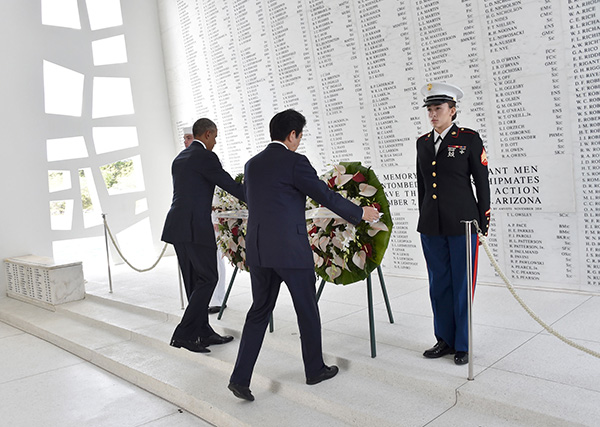Both leaders pay homage to more than 2,400 Americans killed on Dec 7, 1941 at Pearl Harbor

Obama (left) and Abe place wreaths at the USS Arizona Memorial at Pearl Harbor in Honolulu, Hawaii. — AFP photo
PEARL HARBOR, United States: The leaders of war-time enemies America and Japan made a poignant joint pilgrimage to Pearl Harbor Tuesday, issuing symbolic declarations about the power of reconciliation and warning against the drumbeat of conflict.
Seventy-five years after Japanese pilots brought war to idyllic Hawaii and dragged the United States into World War II, Japanese Prime Minister Shinzo Abe offered his “sincere and everlasting condolences.”
Abe and US President Barack Obama paid homage to the more than 2,400 Americans killed on December 7, 1941, delivering a wreath of peace lilies and standing in silence before a shrine to those lost on the USS Arizona — roughly half of all those killed.
Abe’s visit is a high-profile mark of contrition by a leader for whom Japan’s wartime past is often a sensitive domestic issue.
“We must never repeat the horrors of war,” he said. “What has bonded us together is the power of reconciliation, made possible through the spirit of tolerance.”
Obama — who last May made a solemn pilgrimage to Hiroshima, the target of a US nuclear bomb that effectively ended the war — issued remarks that rang with history and America’s current hypercharged politics.
“I welcome you here in the spirit of friendship,” he told Abe. “I hope that, together, we send a message to the world that there is more to be won in peace than in war, that reconciliation carries more rewards than retribution.”
“Even when hatred burns hottest, even when the tug of tribalism is at its most primal, we must resist the urge to turn inward,” Obama said against the backdrop of the USS Arizona.
“We must resist the urge to demonize those who are different.”
The meeting comes as Obama prepares to leave office and with Abe leading Japan into uncharted waters after remarks by incoming US president Donald Trump clouded US-Japanese relations.
Trump, who takes office on January 20, appeared during his campaign to suggest Japan break a taboo and develop its own nuclear weapons.
He caused consternation again last week when he threatened to revive the global nuclear arms race.
The US president-elect has also declared his opposition to the Trans-Pacific Partnership, effectively killing a major trade deal that Obama championed and Abe put at the heart of his economic strategy.
And — on the campaign trail at least — Trump called into question US security guarantees that shielded Japan through the Cold War and later the rise of an increasingly confident China.
What he will do in office is unknown.
Three Japanese prime ministers, including Abe’s grandfather, visited Hawaii in the 1950s but Abe is the first sitting PM to pay his respects at the USS Arizona Memorial, which was built in the 1960s.
In an emotive speech on the waterfront, he imagined the long-silent voices of American victims chatting about their futures and their dreams, praying for as-yet unborn children before the carnage.
“All of that was brought to an end,” he said in Japanese. “When I contemplate that solemn reality, I am rendered entirely speechless.”
Meanwhile, in Tokyo, cabinet minister Masahiro Imamura offered prayers at the Yasukuni war shrine that has been a flashpoint for criticism by countries that suffered under Japanese aggression in the first half of the 20th century.
“I reported about work to the gods and prayed for our country’s peace and prosperity,” he said, according to the Asahi Shimbun daily, stressing that the visit had “nothing to do with” Abe’s trip to Pearl Harbor.
Those honored by the controversial shrine include senior military and political figures convicted of war crimes.
In 1941, the legendary Admiral Isoroku Yamamoto maneuvered six aircraft carriers to within 240 miles (385 kilometers) of Oahu and unleashed two waves of dive bombers.
The US Pacific fleet, formerly Japan’s main rival in the region, lost 21 warships and 328 planes.
After Pearl Harbor, the US Congress declared war on Japan. Three days later, Japan’s European ally Nazi Germany declared war on the United States in turn.
“Here at Pearl Harbor, America’s first battle of the Second World War roused a nation,” Obama said. “Here in so many ways, America came of age.”
Three quarters of a century on, he added, the alliance between the United States and Japan “has never been stronger.”
Only five of the USS Arizona’s crewmen are still alive. While the memorial remains a tourist draw, in Hawaii — Obama’s home state — the divisions of war have given way to a shared present.
“Hawaii has a very multi-ethnic population with a very large Japanese population,” Stanley Chang, a Democratic state senator, told AFP.
“I don’t think there is any feeling of antipathy toward the Japanese 75 years after the attack.” — AFP
